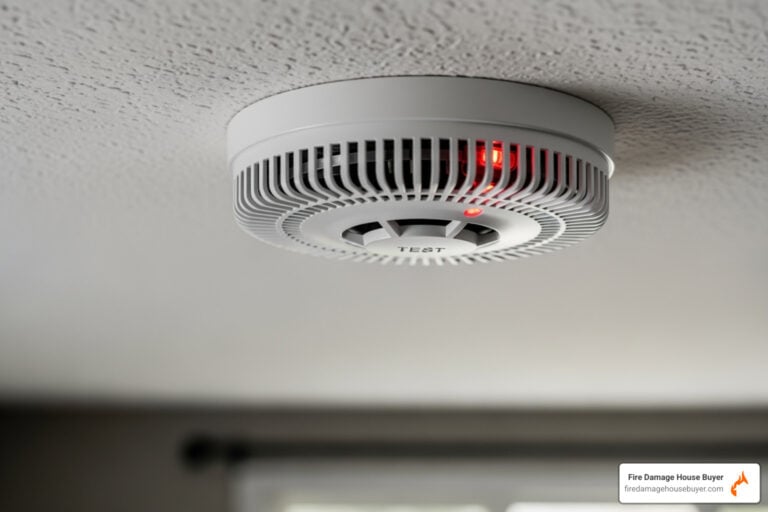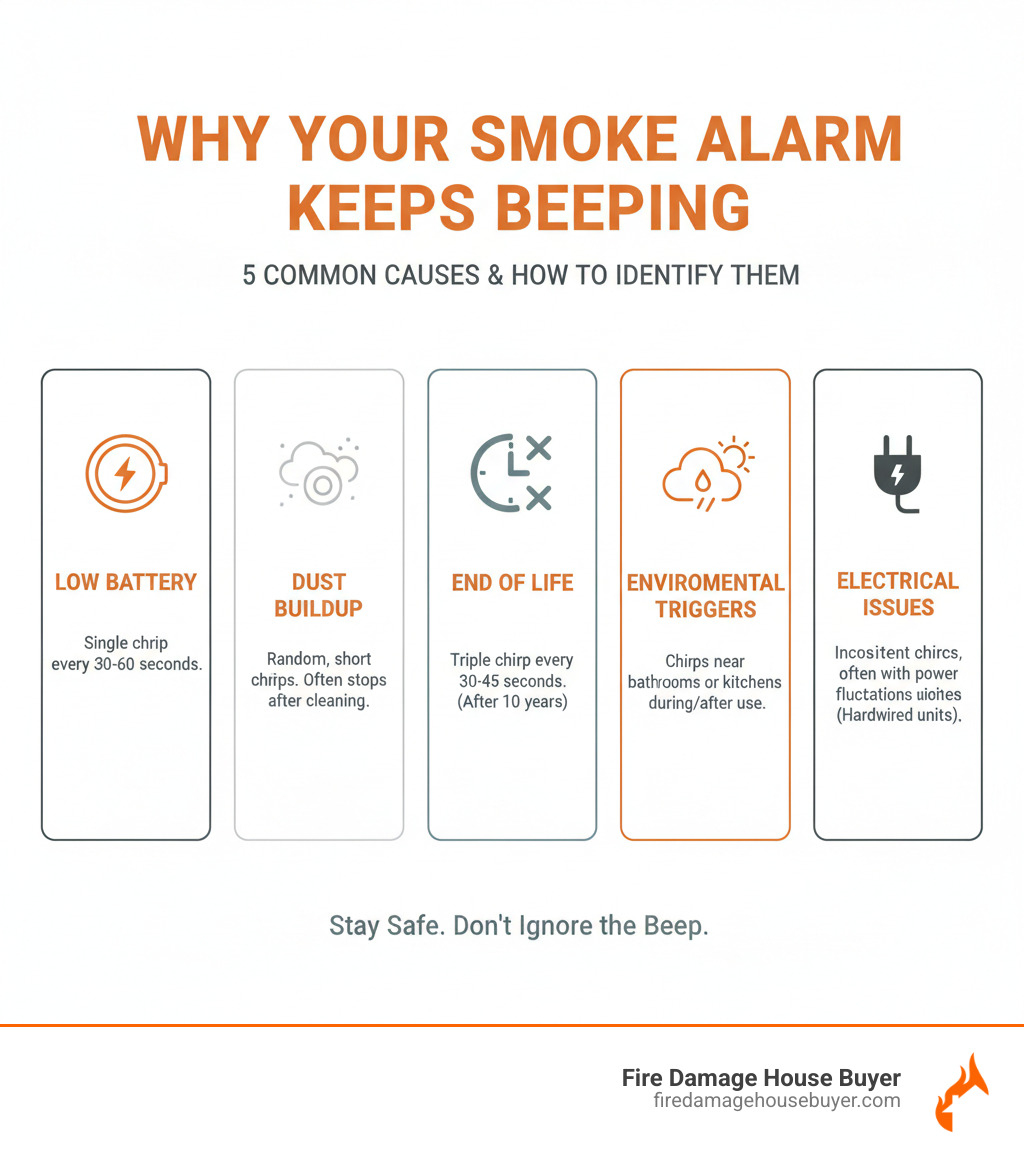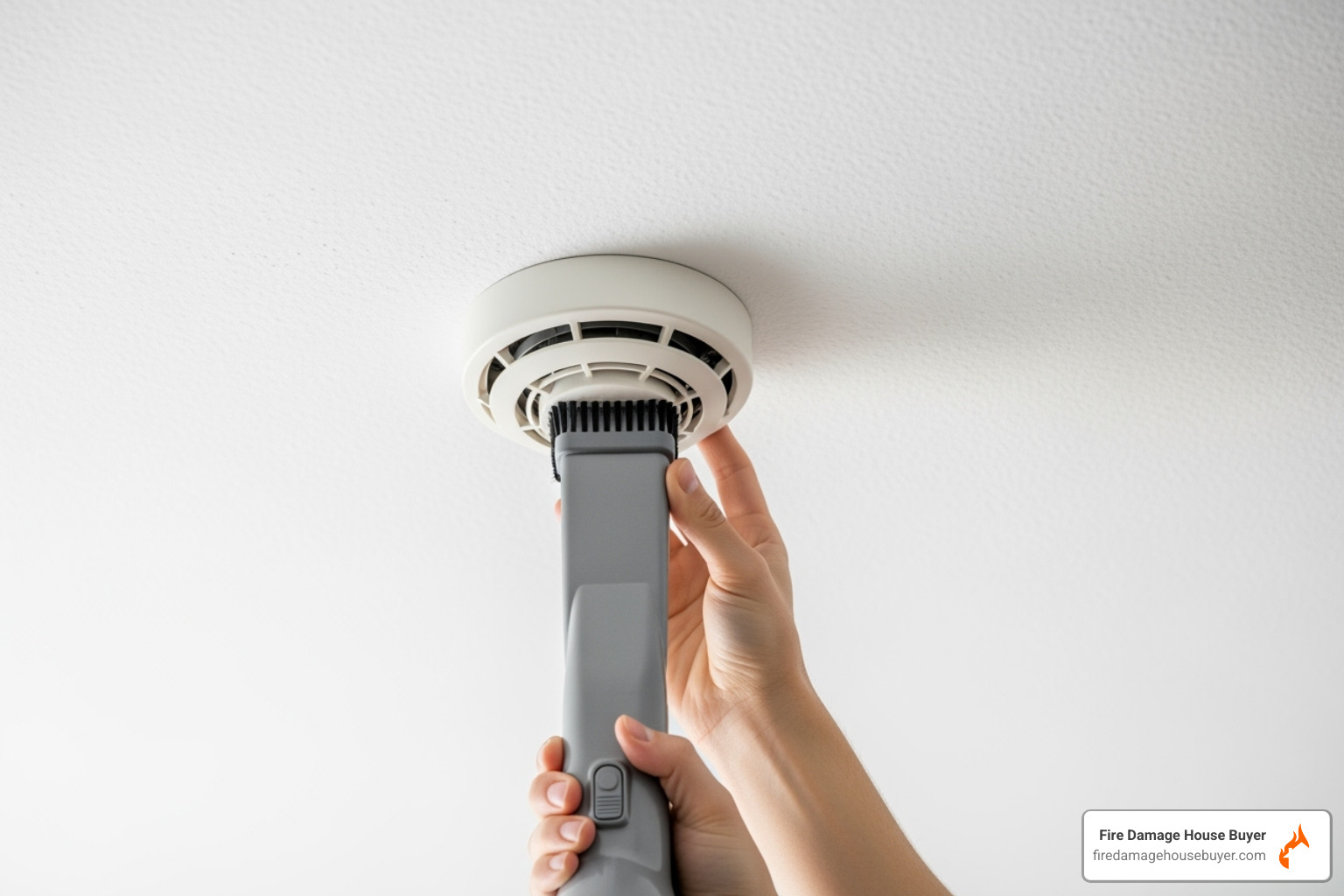Understanding the Chirp: A Critical Safety Signal You Can’t Ignore
Why does my house fire alarm keep beeping is one of the most common questions homeowners ask, and it’s crucial to understand that this persistent chirping isn’t just an annoyance—it’s your alarm trying to communicate a specific problem that needs your attention.
Common reasons your fire alarm keeps beeping:
- Low Battery – The most frequent cause, typically a single chirp every 30-60 seconds
- End of Life – Alarms older than 10 years signal they need replacement
- Dust or Debris – Accumulated particles blocking sensors
- Environmental Factors – Steam, humidity, or temperature changes
- Electrical Issues – Loose wiring or tripped circuit breakers in hardwired units
- Sensor Malfunction – Damaged components, especially after fire or water exposure
According to the National Fire Protection Association (NFPA), three out of five home fire deaths occur in properties without working smoke alarms. This stark statistic highlights why you cannot simply ignore or disable a beeping alarm—even when it seems like a false alarm. That persistent chirp is your home’s early warning system telling you something needs fixing.
A beeping fire alarm after a house fire is particularly concerning, as it may indicate compromised sensors from heat or water damage, signaling deeper issues with your home’s safety systems and potentially your entire electrical infrastructure.
I’m Daniel Cabrera, and over 15 years of buying fire-damaged homes, I’ve seen countless situations where house fire alarms becomes the first signal that homeowners face more extensive post-fire damage than initially apparent. This guide walks you through the troubleshooting steps to silence that chirp and, more importantly, ensure your family’s safety.
Step 1: Decode the Beeps – What Is Your Alarm Trying to Tell You?
Before you can fix the problem, you need to understand what your smoke alarm is trying to tell you. Different beep patterns signal different issues. Learning to recognize them is the first step in troubleshooting why your house fire alarm keeps beeping.
Here’s a breakdown of common beep patterns and their meanings:
- Single Chirp Every 30-60 Seconds: This is the most common signal and almost always indicates a low battery. It’s your alarm’s way of telling you it needs a new battery.
- Three Continuous Beeps, Repeatedly: This is a full alarm sound, meaning the unit has detected smoke. You should immediately check for fire, burnt food, or excessive steam. Always treat this sound seriously.
- Four Continuous Beeps, Repeatedly: For combination smoke and carbon monoxide (CO) alarms, this pattern signals the detection of carbon monoxide. CO is an invisible, odorless gas, so this is a critical warning. Evacuate the building and call emergency services immediately.
- Intermittent or Erratic Beeps: If the beeping is inconsistent and doesn’t fit the patterns above, it could indicate a malfunction, a dirty sensor, or an end-of-life signal.
- Longer, Sustained Beep or Multiple Rapid Beeps: Some alarms use unique patterns for specific fault codes.
Consult Your User Manual: While these patterns are common, always refer to your smoke alarm’s user manual for the exact meaning of its beep codes. If you can’t find it, a quick online search with the brand and model number usually works.
By identifying the beep pattern, you can narrow down the cause and move on to the right troubleshooting steps.
| Beep Pattern | Common Meaning |
|---|---|
| Single, short chirp every 30-60 seconds | Low Battery Warning |
| 3 continuous beeps, repeated | Smoke Detected (Fire Alarm) |
| 4 continuous beeps, repeated | Carbon Monoxide Detected (CO Alarm) |
| Erratic, inconsistent beeping, or not matching other patterns | Malfunction, Dirty Sensor, End-of-Life |
| Longer, sustained beep or multiple rapid beeps | System Fault/Error Code |
Step 2: Check the Power Source (Batteries and Electrical)
A faulty power source is the most common reason a fire alarm keeps beeping. This can range from a simple low battery to a more complex electrical issue.
Battery Issues
Most alarms, including hardwired ones, have a battery. A low battery is the number one cause of that annoying, intermittent chirp.
- Replace the Battery: Change standard 9V batteries every six months. A good reminder is to do it when you change your clocks for Daylight Saving Time. If you have a sealed unit with a 10-year lithium battery, you’ll need to replace the entire alarm when it starts chirping.
- Check the Connection: Ensure the new battery is installed correctly, with the positive (+) and negative (-) terminals aligned. Make sure the battery compartment is fully closed.
- Clean the Terminals: If you see any corrosion (a white, crusty substance) on the battery contacts, clean it off with a cotton swab and rubbing alcohol.
Electrical Issues (for Hardwired Alarms)
If you have a hardwired alarm, the problem might be with your home’s electrical system.
- Check the Circuit Breaker: A tripped breaker will cut power to your alarm, causing it to run on its backup battery. If the battery then gets low, it will chirp. Find your electrical panel and see if any breakers are in the “off” or middle position.
- Look for Loose Wires: A loose connection can interrupt the power flow, causing the alarm to chirp. This is especially common in interconnected systems. If you suspect this, it’s best to consult a professional, as it can be a fire hazard. For more information on post-fire electrical safety, see our guide on Legal and Financial Considerations After Fire.
How to Reset Your Smoke Alarm
After changing the battery or fixing a power issue, you may need to reset the alarm to clear its internal memory.
- Turn off the power to the alarm at the circuit breaker.
- Remove the alarm from the ceiling and disconnect it.
- Take out the battery.
- Press and hold the test button for 15-20 seconds to drain any remaining power.
- Reinstall the battery, reconnect the power, and put the alarm back. It should chirp once to confirm it’s working.
This process, often called a “hard reset,” resolves most persistent chirping issues.
Step 3: Inspect for Environmental Triggers and Debris
If the power source isn’t the problem, the next step is to check the alarm’s environment. Sometimes, the reason why your house fire alarm keeps beeping has nothing to do with a malfunction and everything to do with its surroundings.
Common Environmental Triggers
Smoke alarms are sensitive and can be triggered by things other than smoke:
- High Humidity and Steam: Steam from a hot shower or cooking can sometimes set off an alarm, especially if it’s located too close to a bathroom or kitchen.
- Cooking Fumes: Smoke from cooking, even if it’s just a bit of burnt toast, can cause a false alarm. This is why the NFPA recommends against placing smoke detectors directly in kitchens.
- Extreme Temperatures: Drastic temperature changes, such as those near-drafty windows or heating vents, can affect the alarm’s sensors and cause it to chirp.
- Dust and Debris: Over time, dust, cobwebs, and even small insects can get inside the alarm’s sensing chamber, leading to false alarms or chirping.
How to Clean and Maintain Your Smoke Alarm
Regular cleaning can prevent many of these issues. Aim to clean your alarms at least twice a year.
- Power Down: Turn off the power at the circuit breaker for hardwired units.
- Clean the Vents: Use a vacuum with a soft brush attachment or a can of compressed air to gently remove dust and debris from the vents of the alarm.
- Wipe Down: Use a dry or slightly damp cloth to wipe the outside of the alarm. Avoid using detergents or solvents.
- Power Up: Restore power and test the alarm to ensure it’s working correctly.
Proper placement is also key. Keep alarms away from kitchens, bathrooms, and drafty areas. The National Fire Protection Association (NFPA) provides detailed guidance on where to install alarms for optimal safety. A well-placed and clean alarm is a reliable one.
Step 4: Check the Alarm’s Age
If you’ve tried everything else and your alarm is still chirping, it might simply be too old. Smoke detectors have a limited lifespan and need to be replaced periodically.
When to Replace Your Smoke Alarm
- 10-Year Rule: Most smoke alarms are designed to last for 10 years. After this time, their sensors become less reliable. Many models will produce a specific end-of-life chirp to let you know it’s time for a replacement.
- CO Alarms: Carbon monoxide (CO) and combination alarms typically have a shorter lifespan, often around 7 years.
- Check the Date: Look for a manufacturing date on the back of the alarm. If it’s more than 10 years old (or 7 for CO alarms), it’s time to buy a new one.
Replacing an old alarm is a critical safety measure. According to the NFPA, three out of five home fire deaths occur in homes without working smoke alarms. If your alarm is still chirping after you’ve replaced the battery, cleaned it, and confirmed it’s not expired, it’s likely faulty and needs to be replaced immediately. For more on the various types of damage a fire can inflict, explore our guide on Fire Damage Restoration & Repair.
Step 5: When to Suspect Deeper Issues
If you’ve tried all the troubleshooting steps and your house fire alarm keeps beeping, it might be a sign of a more serious problem.
Internal Malfunction or Electrical Faults
- Faulty Unit: The alarm itself could be defective. If it’s new, check the warranty. If it’s old, replace it.
- Electrical Problems: For hardwired alarms, persistent chirping can indicate issues with your home’s wiring. This is especially true in interconnected systems, where a problem in one unit can affect them all. If you suspect an electrical fault, it’s best to consult a professional.
Why is My Alarm Beeping After a Fire?
A beeping alarm after a house fire is a critical warning. The fire, smoke, and water used to extinguish it can cause significant damage that isn’t always visible.
- Sensor Damage: Heat and smoke can permanently damage the alarm’s sensitive internal components, leading to constant beeping or complete failure.
- Water Damage: Water from firefighting efforts can short-circuit the alarm’s electronics.
- Electrical System Damage: A fire can compromise your home’s entire electrical system. A beeping alarm might be the first sign of this hidden danger.
A beeping alarm after a fire is more than an annoyance; it’s a red flag for potentially widespread damage. If you’re wondering how your insurance covers this, our guide on Does House Insurance Cover Fire Damage? can help.
Beyond the Beep: When an Alarm Signals Overwhelming Damage
A persistently beeping fire alarm is frustrating, but it’s a problem you can usually fix with a fresh battery or a good cleaning. However, when that chirp follows a house fire, it often represents something far more serious—a symptom of extensive damage that goes well beyond a single malfunctioning device.
The journey of Cleaning Up After a House Fire is rarely straightforward. Soot penetrates every surface, smoke odor embeds itself into walls and floors, and water from firefighting efforts seeps into places you never knew existed. Then comes the daunting task of Fire Damage Restoration & Repair, which can quickly become overwhelming both financially and emotionally.
Consider a Simpler Solution for Your Fire-Damaged Home
Repairing fire damage can be incredibly expensive. Minor smoke damage can cost thousands, while moderate to severe damage can easily reach tens or even hundreds of thousands of dollars. This doesn’t even account for the stress of dealing with insurance claims, finding trustworthy contractors, and the long, disruptive process of rebuilding.
There’s a straightforward alternative that many homeowners don’t realize exists. Instead of pouring more time, money, and emotional energy into a damaged property, you can sell your house as-is. We specialize in buying fire-damaged houses in any condition across a wide range of states, including Alabama, Alaska, Arizona, California, Colorado, Florida, Georgia, Illinois, Maryland, Massachusetts, Nevada, New Jersey, New York, North Carolina, Ohio, Oregon, Pennsylvania, South Carolina, Tennessee, Texas, Virginia, Washington, and many more.
When you Sell Fire Damaged House to us, no repairs needed means exactly that—we buy your property in its current state, smoke damage, water damage, structural issues and all. We offer a fast cash offer, allowing you to bypass realtor commissions, avoid the complexities of the traditional selling market, and close quickly. This provides a hassle-free way to move forward with your life without the burden of a damaged home weighing you down. Learn how to sell a fire-damaged house quickly and find just how simple the process can be when you’re ready to turn the page.
Frequently Asked Questions about Beeping Fire Alarms
How often should I replace my smoke alarm batteries?
For standard alkaline batteries, replace them twice a year. A good reminder is to do it when you change your clocks for Daylight Saving Time. If your alarm has a 10-year lithium battery, it will last for the life of the unit. Regardless of the type, test your alarms monthly by pressing the test button.
Why does my alarm always seem to start beeping in the middle of the night?
This is a common issue. As the temperature drops overnight, the battery’s power output can temporarily decrease. If the battery is already weak, this dip is enough to trigger the low-battery chirp.
Can I just take the battery out to stop the beeping?
No, you should never do this. A smoke alarm without a working battery cannot protect you in a fire. As the NFPA highlights, three out of five home fire deaths occur in properties without working smoke alarms. The beeping is a safety alert. Use the “hush” button to temporarily silence it while you fix the problem, but never remove the battery and leave it out.
Your Next Steps for a Safe and Peaceful Home
Understanding why your house fire alarm keeps beeping is the first critical step toward ensuring the safety of your home and loved ones. We’ve walked through the common culprits, from low batteries and environmental factors to aging units and potential electrical issues. By systematically troubleshooting these problems, you can often silence that annoying chirp and restore your peace of mind.
Remember to prioritize safety above all else. Never ignore a beeping alarm, and always treat a full alarm sound as a potential emergency. Regular maintenance, including battery replacement and cleaning, is essential for keeping these life-saving devices in peak condition.
For homeowners facing extensive issues, especially after a fire, the path to recovery can be daunting. If repairs seem overwhelming, Fire Damage House Buyer offers a straightforward alternative to Sell Fire Damaged House as-is, allowing you to move forward without the stress of restoration. Contact Us for a no-obligation offer and let us help you find a simpler solution.




